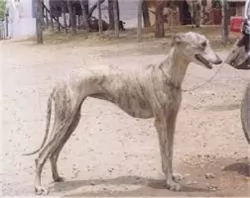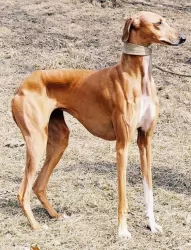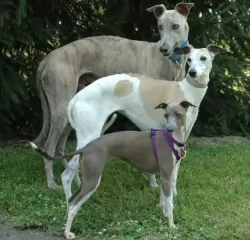 MyDogBreeds
MyDogBreedsRampur Greyhound is originated from India but Mixed is originated from United States. Rampur Greyhound may grow 35 cm / 13 inches shorter than Mixed. Rampur Greyhound may weigh 82 kg / 180 pounds lesser than Mixed. Rampur Greyhound may live 6 years less than Mixed. Rampur Greyhound may have less litter size than Mixed. Rampur Greyhound requires Low maintenance. But Mixed requires Moderate maintenance
 Known also as the North-Indian Greyhound or the Rampur Hound, the Rampur Greyhound is native to the Rampur area of Northern India.
Known also as the North-Indian Greyhound or the Rampur Hound, the Rampur Greyhound is native to the Rampur area of Northern India.
This dog is a member of the sighthound family, and in the past has been sought after for its efforts in controlling jackals.
The dog is also able to cover large distances at high speed. Some commemorative postage stamps were issued in 2005 as acknowledgement of this attractive dog breed.
Many people are inclined to think that mixed breed or cross-breed dogs, also known as mutts or mongrels or designer dogs are just pavement specials. They think they look nothing much better than junkyard mutts.
This may be so, but not always, and these mixed breed dogs always seem to have hearts of gold. A Mixed breed is a dog that has parent’s who aren’t registered and who come from different breeds. In other words the parents aren’t of the same breed.
Guessing a cross breed’s ancestry can be difficult as these mixed-breeds have more genetic variation than pure breeds. They've been around since ancient times. The dogs originate in different countries and they all have different coats, different sizes and different temperaments.
It is sad but true – there are literally millions of mixed dogs worldwide, some of which never know what it is to live with- and be lovingly cared for by a human being.
 In height, the Rampur Greyhound stands at between 55 and 75 cm and they weigh in the region of 27 to 30kg.
In height, the Rampur Greyhound stands at between 55 and 75 cm and they weigh in the region of 27 to 30kg.
They are much the same as other greyhounds, but they’re somewhat wider and just a little bit more muscular. The head too, is broader than the slimmer head of the English Greyhound. Of course these dogs are known for the slim, pointed nose, the high-set ears which are sometimes half-floppy, half-erect. The eyes are large and the tail is long and slim.
The coat is short and smooth and is in colors such as gray, fawn, some white, some black with white and some brindle.
Your Rampur Greyhound is social around his human family, lapping up all their attention. He is the kind of dog that can be seen sprinting at high speed over the fields, but he is also not averse to lying peacefully with you on the sofa.
He is far better suited to a home with large gardens or on a farm as opposed to being confined to a small property in the city.
He can be gentle but when required, he becomes an excellent watchdog. He will need training and socialization as he can be rambunctious indoors, knocking things over. Training makes him obedient and restrained They get on well with children and other pets in the home.
Sometimes Mixed dog breeds come about from two dogs meeting on the streets and mating or it could be two pure-breeds accidentally mating, resulting in a mixed breed.
The mixed breed dog puppy could inherit looks from just the one purebred parent so that he grows up looking like a pure-breed. With a cross breed the standard for breeding isn’t the same for purebreds where the appearance and temperament is more or less the same.
A mixed breed dog doesn’t have these standards to conform to and they are as varied and unique as the colors in the rainbow. It’s not possible to know what a mixed breed dog’s puppies will look like. A typical example of a mixed breed is a Labradoodle. People love the temperament of the Labrador but they want the low shedding qualities of the Poodle as well.
Mixed breed dogs can be small or large and that means different litter sizes. If you don’t want your Mixed dog breed becoming a parent, you can spay or neuter your dog.
There are many people who avoid choosing a ridiculously high priced pure breed puppy and they prefer to choose a mixed breed. This is partly because these mixed breed dogs are healthy, resilient and nearly always a good match for you and your family.
 Everyone loves the Rampur Greyhound, and why not? He is fantastic with children because of his gentle, loving nature. He is a playful dog too and will require a daily dose of exercise.
Everyone loves the Rampur Greyhound, and why not? He is fantastic with children because of his gentle, loving nature. He is a playful dog too and will require a daily dose of exercise.
They aren’t noisy dogs, being naturally timid, but he still loves to get out and about with his daily walk to see and experience new sights and smells.
When you bring a Rampur Greyhound into your home, you’re bringing in a whole lot of wonderful companionship, love and loyalty from this remarkable canine.
Doesn’t matter what your Mixed breed dog looks like – he is a unique individual and you can never really predict what kind of a character he will turn out to be.
He might inherit a bit of placid behavior from one parent and a bit of clownish behavior from the other. It’s what makes them so special.
Ask most dog lovers who have owned a mixed breed and you will usually hear them say that they wouldn’t trade their amazing loyal and devoted pet for all the money in the world.
 Rampur Hounds are generally a healthy dog breed, and their health is enhanced when you take good care of them and provide them with lots of love, good food and exercise.
Rampur Hounds are generally a healthy dog breed, and their health is enhanced when you take good care of them and provide them with lots of love, good food and exercise.
Still, every dog can fall prey to any one of the many dog illnesses there are such as cancer, bloat, diabetes, ear infections, epilepsy, obesity, eye problems and others.
This can be deadly for your dog. Gas collects in the stomach and the stomach can twist. You’ll notice your dog has a hard, swollen stomach and he is lethargic, but restless. Getting him to the vet as quickly as possible should be a top priority.
Your pet can develop all kinds of skin problems where he bites and scratches, causing bacteria. It can be terribly painful for your pet, and even ticks and fleas on the skin can cause cause a lot of irritation for your pet.
Some people add in omega 3 oils to their pet’s diet to help with dry skin. Don’t let your pet suffer with skin allergies and other problems that are itchy and painful. Get him to the vet so you can get to the root of what is causing him so much frustration with his skin.
All dogs, whether pure breeds or mixed breeds, need to be excellently cared for. When you consider the unconditional love your dog gives you, you want to ensure that you’re kind and loving towards him.
Every dog can be prone to common dog illnesses and there are some genetic predispositions for dogs with certain breeds within them.
All dogs can battle with problem teeth, but it appears to be more rife with smaller dogs. Dental disease starts with tartar build-up and when it isn’t removed from the teeth it progresses towards infection of the gums and teeth.
What you need to know is that not caring for the teeth can mean your pet losing his teeth but also putting your dog in danger of joint disease and problems with the kidneys and heart.
Obesity is a huge factor in small- and large dogs and can pave the way for other diseases with your pet. Being obese can shorten the life of your pet because it contributes to heart disease, digestive disorders, back pain and joint problems.
Fleas, ticks, mites and worms can play havoc with the health of your pet. Some of these parasites can then be transmitted from your pet to you. Parasites can cause pain, weight loss and even death for your pet so it is important to be vigilant in these matters.
Bloat, when the stomach twists and fills with gas as well as cancer and heart disease are just some of the more common diseases to look out for.
 Active and playful, your Rampur Hound will need a lot of space to let off steam and run. He will look forward to his walks every day with you. Maybe you’ll need a tennis racquet to hit the ball far enough for him to sprint after.
Active and playful, your Rampur Hound will need a lot of space to let off steam and run. He will look forward to his walks every day with you. Maybe you’ll need a tennis racquet to hit the ball far enough for him to sprint after.
These dogs, with their short coats, are considered to be low maintenance, even though they do shed.
A good brush twice a week will do them good and they just love being massaged. It’s your time to run your hands over the slim, muscled body to make sure there are no unusual lumps on him.
Follow a regular grooming regime when you brush him. Check inside his ears, have a look at his eyes to make sure they’re still bright. Check inside his mouth for bad teeth which could be causing him terrible pain and make sure to trim his nails.
To be healthy and content, every dog needs good food.For convenience it can be great to feed your Greyhound one of the high quality commercially manufactured dog foods. To vary the food occasionally, add in some delicious home-made food too.
Once or twice a week you can simply add some home-made food to the dry kibble. Boiled chicken, brown rice or pasta and spinach, sweet potatoes and carrots are a healthy choice for your pet. Nothing complicated.
If you cook it in bulk, you can chop it all up and feed smaller portions to your pet. Some raw meat added in from time to time will also keep him healthy.
A simple meal like this will please your dog no end. No exotic spices and strange, weird kinds of food which could upset his stomach – just plain and simple the way dogs love it.
Ensure there is always a bowl of fresh, cool water within his reach.
Good nutritious food, exercise, grooming, a dry place to sleep, taking your pet to the vet when he is sick as well as plenty of love and attention will ensure your Mixed dog breed’s health and happiness.
Keep die diet of your pet simple and consistent to avoid digestive problems. Quality commercially manufactured food is a good choice. Boiled chicken, brown rice and cooked or raw vegetables will be excellent added into your dog’s kibble from time to time. Add in some raw meat occasionally as it is good for warding off skin diseases.
Exercise your pet regularly, but don’t overdo it with young dogs as it can lead to joint problems later on in life.